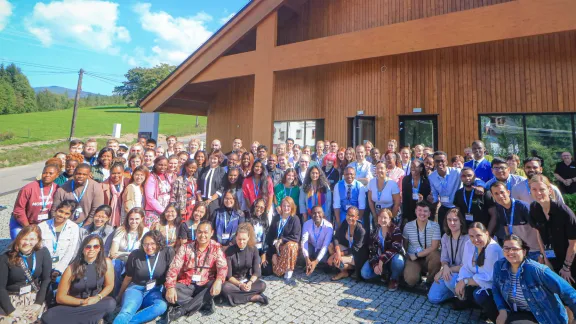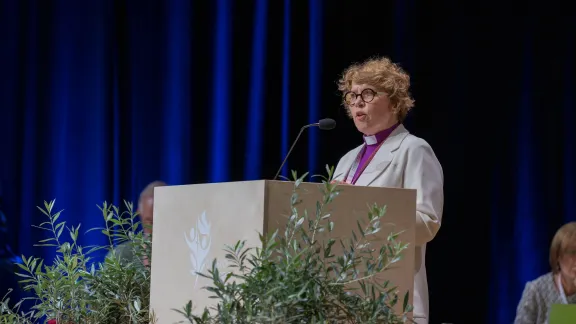Preamble
As delegates to the Thirteenth Assembly of The Lutheran World Federation (LWF), we gathered in Kraków, Poland, from 13 to 19 September 2023, to worship, reflect, discuss, and discern the way forward for our global communion of churches, inspired by the theme of “One Body, One Spirit, One Hope” (Ephesians 4:4).
Before we came here, we gathered in our regions and we gathered in Poland, as youth, women, and for the first time as men, for our Pre-Assemblies.
We are deeply grateful to the Evangelical Church of the Augsburg Confession in Poland, its leaders, congregations, and volunteers, for their generous hospitality. A minority church in the country, witnessing in an often-challenging context, the Polish Lutheran church has truly shown us that every church has gifts to share with the rest of the communion.
Together we affirm that we are One in the Body of Christ, empowered by the One Spirit and called to proclaim the One Hope of the Risen Christ.
During this Assembly, we were reminded of the urgency of providing a coherent, credible, and united witness to the gospel amid the many crises which afflict our polarized and fragmented world today.
Looking ahead to the 500th anniversary of the Augsburg Confession in 2030, we remember the call of the reformers of the sixteenth century, recalled by our keynote speaker, to be “an ever-reforming church,” working for Christian unity, but also striving to unite into One Body all of humanity, together with all of creation, as we witness to the gospel in words and actions.
One Body
In worship, we reflected on the incarnation, when God became a baby in a manger, a vulnerable body of flesh and blood. The incarnation challenges us to recognize God in every person and in all of creation, acknowledging our deep-down unity.
But we live in a divided world, where bodies are hurting, rejected, excluded, and the earth, our shared home, is suffering from the effects of growing environmental and climate emergencies.
The relentless rise in global temperatures, with this year, already now ranking as the hottest on record, has meant loss of biodiversity, lives, livelihoods, and whole communities. We hear and acknowledge the urgent call to action. We are a part of God’s creation. Led by young people, we pledge to be more effective advocates for economic and climate justice, safeguarding the planet and its resources for future generations. Together we reaffirm that creation is not for sale.
We gathered in a region where Russia’s war against Ukraine has left hundreds of thousands dead and injured, with millions more displaced by the fighting. Across the globe, we hear the cries of bodies maimed, killed or displaced by war and conflict. We remember Ethiopia, Haiti, Manipur, Myanmar, Nigeria, Palestine, Sudan, Venezuela, Yemen, and many other places where violence claims lives and disrupts whole communities. Our faith calls us to be messengers of justice, peace and reconciliation, standing alongside those who are most vulnerable.
This year has seen the highest number of refugees and internally displaced people, with official figures surpassing 108 million. Our faith calls us to welcome the stranger and we are grateful to those who offer shelter and support, recalling Christ‘s words, ”I was a stranger and you welcomed me” (Matthew 25:35).
We reject all forms of violence and discrimination based on race, ethnicity, gender, sexuality, class, age, disability, xenophobia, caste, or social background. All people are created in the image of God, with equal dignity that cannot be compromised.
On the tenth anniversary of the LWF Gender Justice Policy, we celebrate the progress we have made and reaffirm our unwavering commitment to the empowerment of women and to an end to sexual and gender-based violence, which saw a sharp increase during the COVID-19 pandemic. We call for stronger partnerships between women and men to combat patriarchy and we affirm an understanding of masculinity that is characterized by caring, nurturing, and serving.
We reiterate the call of the LWF, first made almost four decades ago, to affirm the full participation of women in the ordained ministry. There should be no distinction between the ordained ministry of women and men.
We are crying with women who are still denied their equal dignity and suffer oppression on racial, cultural or religious pretexts. We call for theological reflection and education around gender justice and the continuous empowerment of women and girls, ensuring that they can enjoy a future that is fair and just and full of opportunities.
We are stronger because of diverse participation in the life of the communion. We commit ourselves to working for increased intergenerational justice. While some progress has been made, we do not take this for granted. We must do better to ensure meaningful participation of youth in all areas of church life, including governance and decision-making.
We are called to recognize Christ in one another, and to combat dehumanizing hate speech that leads to harmful actions against individuals or communities. We are all united in the body of Christ and we know that when one part of the body hurts, the whole body suffers. As the Apostle Paul reminds us: “There is no longer Jew or Greek, there is no longer slave or free, there is no longer male and female; for all of you are one in Christ Jesus.” (Galatians 3:28).
Just as our faith compels us to care for the physical well-being of others, so we must also prioritize mental, spiritual, and emotional health. As a global faith community, we are called to combat stigma and isolation, creating spaces of acceptance, accessibility and inclusion to which people can turn in times of need. We have observed an increase in mental health concerns, as a result of the COVID-19 pandemic and the growing climate emergency, as well as violence, discrimination, and polarization. This requires urgent practical action, alongside theological reflection. The LWF is a communion of churches proclaiming the gospel in different ways, across all seasons, cultures, economies, and political contexts, as we seek to become the salt of the earth and the light of the world. We celebrate the gift of unity in diversity, knowing that the center is always Christ.
Our member churches differ significantly between countries and regions. Mutual accountability is a mark of the church as we seek to share one another’s burdens. Through conversation we discern what it means to be the One Body of Christ in 99 countries and be enriched by our diversity. We need each other’s experiences, insights, and critique. We are reminded and encouraged by Christ who holds all things together (Colossians 1:17).
The LWF is confessional communion, but it is not an inward-looking confessionalist body. Since its foundation, working for Christian unity has been one of LWF’s core tasks. We see ourselves as part of the broad ecumenical movement, with close connections to our partners and a shared commitment to heed Christ’s call “that they may all be one” (John 17:21).
To be Lutheran is to be ecumenical. The Lord calls us to recognize that the church is One Body in Christ in humility. We have been engaged in fruitful ecumenical dialogues for decades and we seek for deeper and wider understanding among all Christians.
We are well aware of the disagreements and divisions that have torn Christian churches apart over the centuries and continue to cause tensions in our own churches, within our global Lutheran communion and among Christians worldwide. But we also know that there is more that unites us than separates us, and we pledge to walk forward together.
One Spirit
In worship we confessed our broken hearts and prayed that God create in us a clean heart. We heard the promise that God’s Spirit has renewed and reconciled us, moving and inspiring us to live the closeness to God already present, and closer to one another.
We live in a world of increasing polarization where misleading theologies create exclusive or escapist communities, accumulating power and wealth in the hands of a few, while sowing fear and fragmentation within churches and communities. We acknowledged that to overcome this, we need to ground our teaching and preaching on responsible theologies, as a global communion and in the member churches.
Responsible theology is grounded in the Bible. It heals wounds, creates unity, and strengthens communion. Responsible theology is holistic, uses inclusive language and diverse and accessible means of communication. Responsible theology builds inclusive communities, daring to renew its language and ways of reaching out to people on the margins. Responsible theology gives space for the renewing and reforming power of the One Spirit.
We underline the importance of stronger theological education and leadership formation for the sustainability of our churches, equipping people to engage with complex issues without resorting to simplistic answers.
Constructive interfaith engagement should be a special focus of theological education, both through high-level dialogue, as well as emphasizing the importance of harmonious daily life encounters with people of other faiths. We are committed to being good neighbors in religiously diverse societies.
At the 1984 Assembly in Budapest, the LWF repudiated Martin Luther’s anti-Judaic diatribes and the violent recommendations of his later writings against the Jews, declaring antisemitism a contradiction and affront to the Gospel. We reaffirm that and express our continued commitment to live out our Lutheran heritage in the Christian faith with love and respect for the Jewish people.
As a communion of churches, we are called to discern the One Spirit from the many spirits of our time (1 Cor 12:10) in order to explore what the Triune God is calling us to do in a world that communicates many contradictory, false, and confusing messages. As we unite in prayer and common worship, in joint studies of Scripture and the Lutheran confessional writings, we discern and act upon God’s divine calling in our world today.
We walked through the camps of Auschwitz-Birkenau.
They were transported as cattle and sent to die.
We went there to face the truth.
They were lied to, humiliated and murdered.
We lamented.
Walking through Auschwitz-Birkenau.
We remembered also other places of unspeakable evil.
We remember that there is one humanity.
That all have the same dignity given by God.
We pledge never to be indifferent.
We pledge to stand against hate speech, lies, atrocities.
We pray, never again.
The Assembly theme reminds us that Body and Spirit belong together, urging us to speak out against all forms of oppression, spiritual and physical. We are called to combat the racism, violence, abuse, inequality and exploitation that are still found in both church and society today.
In some parts of the world, churches suffer from restrictive laws or government policies, limiting their freedom of speech and even subjecting them to persecution if they raise their voices on behalf of justice and human rights. We deplore the discrimination and oppression of our Christian sisters and brothers, wherever it takes place and regardless of their faith or denomination. We ask member churches to pray for them and urge the communion to address this problem.
One Hope
In worship, we remembered that we are one human family and though the storms are rough, Christ is in the boat with us.
Faced with intersecting crises and a push-back on hard-won human rights, we may feel that the challenges ahead of us are overwhelming and insurmountable. During this assembly, we have heard the Risen Christ telling us, "Do not be afraid!"
The One Spirit shows us that another world is possible. The gospel invites us to hope, learning to read the signs of God’s promise everywhere in the world because our hope is built upon Jesus Christ.
As Lutherans, we participate in God’s holistic mission: proclamation, advocacy, diakonia, at international level, as well as locally in our individual churches. We are called through baptism and sent out to proclaim the liberating gospel of Jesus Christ in word and deed. The Spirit calls us to be instruments of justice, peace and reconciliation, healing wounds within our churches and in our common world. Equipped by the Holy Spirit, we are encouraged to build communities of hope wherever the gospel is shared and lived across the globe.
When we speak about hope, we must not be confused by worldly prospects, by false hopes and desires, but must remain focused on a concrete hope for this world and the next. We affirm that it is hope that holds the LWF together as a communion. It inspires us to stand in solidarity with each other, while addressing together the rapid changes and challenges our world is facing.
Hope reminds us that we are one humanity, with no distinction between us. In the waters of baptism, we become aware of the vast communion of saints with us and around us. It is a place of hope, and we give thanks to God for all those who have walked the road of reconciliation before us.
As we reflect on our work as churches in communion, we must find new ways of offering hope to all people. Not an empty hope, but bold hope that is inspired by our faith in God and followed by our actions to serve people who are poor, in need, migrants, refugees and those affected by crises. Hope empowers us to speak out in the public space for justice and human rights. This hope must manifest itself in more tangible ways in the church through its work, worship, and mission.
As Lutherans we are churches in ongoing reformation. In Christ, we experience the joys and sufferings in this world and we are called to name and respond to the challenges within the LWF communion and the world around us. We commit ourselves to learn from our past.
Diakonia is hope in action. We affirm the LWF’s humanitarian and development work, its global engagement, its work with member churches, and partners, offering people in need hope and a future. Working together with people of all faiths, we seek to promote a just, peaceful, and reconciled world.
Growing awareness of the human-made climate emergency and actions to tackle it within our member churches are signs of hope. The LWF must continue to play a crucial role, connecting the work of local churches and communities to global advocacy.
Hope is the lens through which we look at the world, as followers of Christ, journeying together into the future.
Sent into the world
We return to our home countries with a deeper sense of what it means to be churches in communion and with a stronger commitment to strengthen the bonds between us. We walk together as churches in an ecclesial and confessing communion, witnessing to our faith, in God’s holistic mission. We heed the call to live into the gift of reconciliation and unity with all neighbors.
As we journey towards 2030 and the 500th Anniversary of the Augsburg Confession, we rejoice in the ecumenical potential of our confession, which is a plea for unity, intended to hold the Body of Christ, the church, together.
As churches in ongoing reformation, we are called to work for peace in the world, between people, countries, and with the whole of creation.
As One Body, called by the One Spirit, in One Hope, we go from Kraków to all corners of the world, to proclaim the gospel that we are liberated by God’s grace and sent to serve our neighbor.






